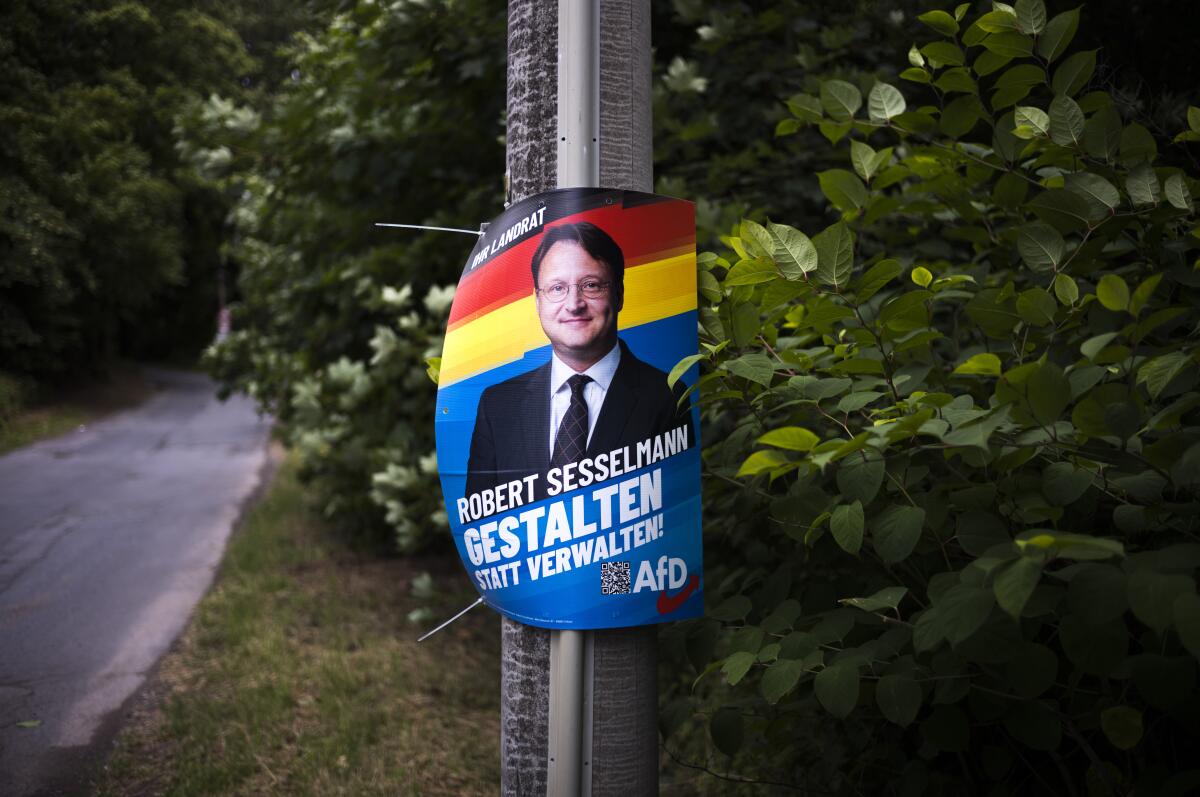German county elected a far-right candidate for first time since Nazi era, raising concern

- Share via
SONNEBERG, Germany — Mike Knoth is more than thrilled that a far-right populist party’s candidate recently won the county administration in his hometown in rural eastern Germany for the first time since the Nazi era.
The gardener despises the country’s established parties, he doesn’t trust the media and he feels there are too many migrants in the country. The far-right party Alternative for Germany, or AfD, he hopes, will improve everything that’s not going well in his eyes in Sonneberg, which is in the southeastern state of Thuringia.
“I think the fact that so many people voted for Alternative for Germany has already given it legitimacy,” Knoth, 50, said during an interview this week as he walked his dog down the town’s deserted main shopping street.
Ukrainian President Volodymyr Zelensky marked the 500th day of the war in a video from a Black Sea island that became the symbol of Ukraine resilience.
But some in Sonneberg haven’t been won over by AfD’s nationalist and antidemocratic rhetoric.
Margret Sturm, an optometrist whose family has been selling glasses for almost 60 years in Sonneberg, voiced her concern over AfD’s victory in an interview with a public television station.
“I told them that I don’t think it’s good to vote for the AfD. And whoever votes for the AfD must know that they have the Nazis in tow,” Sturm told the Associated Press in an interview in her store.
Sturm can barely fathom what happened after the interview was aired last week.
“We got hate mail, threatening phone calls, every minute. We were insulted by people we don’t even know, who don’t know us, who don’t know the business.”
The threats were so relentless that Sturm’s husband installed surveillance cameras inside the store.
But Sturm, 60, said she won’t let anybody silence her.
“People here are afraid to take a stand against the AfD and that makes us even more worried than anything else.”
She said that other residents who oppose the AfD no longer want to voice their criticism openly.
“That’s exactly the kind of intimidation that basically results from the machinery of hatred and incitement and then sadly spreads. And that really worries me,” said Stephan Kramer, the head of Thuringia’s state domestic intelligence agency, told the AP at his office in the state capital, Erfurt.
Kramer has warned for years that AfD’s Thuringia branch is particularly radical and put it under official surveillance more than two years ago as a “proven right-wing extremist” group.
It doesn’t bother Knoth that the AfD is under surveillance by Thuringia’s domestic state intelligence agency for its close ties to far-right extremists.
“It was elected democratically, and I don’t find anything offensive about it,” he said.
Knoth expects the AfD to take a law-and-order approach, curb immigration and make Germany safe.
Tackling migration or fighting crime are hardly topics that belong to the job description of a local county administrator, but the AfD’s Robert Sesselmann campaign on these themes proved to be successful.
The runoff election in Sonneberg county last month pitted Sesselmann against center-right rival Jürgen Köpper. Official figures showed that Sesselmann won by 52.8% to 47.2%.
Sonneberg has a relatively small population of 56,800, but the win was a symbolic milestone for AfD.
The unemployed Radoslaw Schneider, 39, also expects things to improve now that Sesselmann is in charge. He said that AfD “believes that something needs to be done also for the Germans,” and foreigners should no longer get preferential treatment — which will happen now with AfD in power, he thinks.
Alternative for Germany first entered the national parliament in 2017 following an anti-migrant campaign in response to a mass arrival of refugees to Europe.
The party, a decade old, has been polling at record levels nationally with between 18% and 20% of support.
Center-left Chancellor Olaf Scholz’s governing coalition with the environmentalist Greens and the pro-business Free Democrats, meanwhile, faces strong headwind over high immigration, a plan to replace millions of home heating systems, and a reputation for infighting, while inflation remains high.
AfD’s Thuringia leader, Björn Höcke, has espoused revisionist views of Germany’s Nazi past. In 2018, he called the Holocaust memorial in Berlin a “monument of shame” and called for Germany to perform a “180-degree turn” when it comes to the way it remembers its past.
In the early 1930s, Thuringia was one of the first power bases of Adolf Hitler’s National Socialist Party.
Nowadays, the AfD appeals especially to people in the formerly communist and less prosperous eastern states, such as Thuringia.
The pandemic, Russia’s war in Ukraine and the influx of hundreds of thousands of Ukrainian refugees to Germany have also contributed to AfD’s success, Katharina König-Preuss, a state lawmaker with the Left party in Thuringia, said during an interview in the state parliament in Erfurt.
The party has been putting the blame for many problems squarely on immigrants or the national government, she said.
“I would say that a great deal of these racist narratives, which don’t match reality at all, have now caught on with a larger part of the East German population,” said König-Preuss, who is one of the most outspoken critics of the AfD and has received several death threats.
Scholz tried to play down the recent rise of the far-right populists.
“Germany has been a strong democracy for a long time now, since World War II,” Scholz told reporters in Berlin last week after being asked what he’s doing to prevent a resurgence of fascism 77 years since Hitler’s demise.
It was Germany’s Nazi rule, which led to the murder of 6 million European Jews and others, and more than 60 million dead in World War II, that gives Kramer sleepless nights.
“When I look at this development in Germany, the country where industrial mass murder was driven to perfection, then this is different from all other countries,” he said.
In autumn 2024, there will be state elections in Thuringia. The AfD leads in the polls with more than 30%.
If the AfD, which is currently still shunned by all other mainstream parties in Germany, will become part of the state government, then Kramer, who is Jewish, will leave the country with his family.
“We’ve seen before in history where that can lead,” he said. “And I must honestly confess, I have no desire to wait for it to occur again.”
More to Read
Sign up for Essential California
The most important California stories and recommendations in your inbox every morning.
You may occasionally receive promotional content from the Los Angeles Times.











